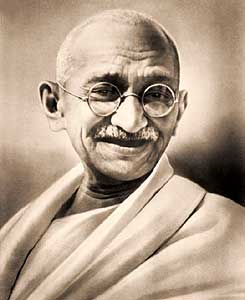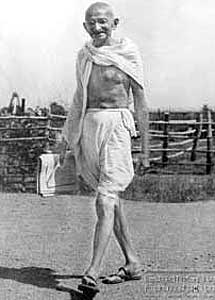 |
 |
 |
Volume
5 - Issue 02 FEBRUARY 2007
|
|
GANDHI ON CIVILIZATION - Part 1
Reader: What do you mean by civilization? Editor: It is not a question of what I mean. Several English writers refuse to call that as civilisation, which passes under that name. Many books have been written on that subject. Societies have been formed to cure the nation of the evils of civilisation. A great English writer has written a work called Civilisation: Its Cause and Cure. Therein, he has called it a disease. Reader: Why don’t we know about such matters? Editor: The answer is simple. We rarely find people arguing against themselves. Those who are intoxicated by modern civilisation are not likely to write against it. Their care would be to find out facts and arguments in support of it, and this they do unconsciously, believing it to be true. A man while he is dreaming, believes in his dream; he is undeceived only when he is awakened from his sleep. A man labouring under the bane of civilisation is like a dreaming man. What we usually read are works of defenders of modern civilisation, which undoubtedly claims among its votaries very brilliant and even some very good men. Their writings hypnotize us. And so one by one, we are drawn into this vortex. Reader: This seems very plausible. Now will you tell me something of what you have read and thought of this civilisation? Editor: Let us first consider what state of things is described by the word “civilisation”. Its true test lies in the fact that people living in it make bodily welfare the object of their life. We will take some examples. The people of Europe today live in better-built houses than they did a hundred years ago. This is considered an emblem of civilisation, and this is also a matter to promote bodily happiness. Formerly, they wore skins and used spears as their weapons.
Now they wear long trousers, and, for embellishing their bodies, they wear a variety of clothing, and instead of spears, they carry with them revolvers containing five or more chambers. If people of a certain country, who have hitherto not been in the habit of wearing much clothing, boots, etc., adopt European clothing, they are supposed to have become civilised out of savagery. Formerly in Europe , people ploughed their lands mainly by manual labour. Now, one man can plough a vast tract by means of steam engine and can thus amass a great wealth. This is called a sign of civilisation. Formerly, only a few men wrote valuable books. Now, anybody writes and prints anything he likes and poisons people’s minds. Formerly, men travelled in wagons. Now they fly through the air in trains at the rate of four hundred and more miles per day. This is considered the height of civilisation. It has been stated that as men progress, they shall be able to travel in airship and reach any part of the world in a few hours. Men will not need the use of their hands and feet. They will press a button and they will have their clothing by their side. They will press another button and they will have their newspaper. A third and a motor car will be waiting for them. They will have a variety of delicately dished up food. Everything will be done by machinery. Formerly, when people wanted to fight with one another, they measured between them their bodily strength; now it is possible to take away thousands of lives by one man working behind a gun from a hill. This is civilisation. Formerly, men worked in the open air only as much as they liked. Now, thousands of workmen meet together and for the sake of maintenance, work in factories or mines. Their condition is worse than that of beasts. They are obliged to work at the risk of their lives, at most dangerous occupations, for the sake of millionaires. Formerly, men were made slaves under physical compulsion. Now they are enslaved by temptations of money and of the luxuries that money can buy. There are now diseases that men never dreamt before, and an army of doctors engaged in finding out their cures, and so hospitals have increased.
This is a test of civilisation. Formerly, special messengers were required and much expense was incurred in order to send letters; today, anyone can abuse his fellow by means of letter for one penny. True, at the same cost, one can send one’s thanks also. Formerly, people had two or three meals consisting of home-made bread and vegetables; now, they require something to eat every two hours so that they have hardly any leisure for anything else. What more need say? All this you can ascertain from several authoritative books. These are all true tests of civilisation. And if anyone speaks to the contrary, know that he is ignorant. This civilisation takes note of neither morality nor of religion. Its votaries calmly state that their business is not to teach religion. Some even consider it to be a superstitious growth. Others put on the cloak of religion and prate about morality. But, after twenty years of experience, I have come to the conclusions that immorality is often taught in the name of morality. Even a child can understand that in all that I have described above, there can be no inducement to morality. Civilisation seeks to increase bodily comforts, and it fails miserably even in doing so. This civilisation is irreligion, and it has taken such a hold on the people of Europe that those who are in it appear to be half mad. They lack real strength or courage. They keep their energy by intoxication. They can be hardly happy in solitude. This civilisation is eating into the vitals of the English nation. ……They [the English] are a shrewd nation and I therefore believe they will cast off the evil. They are enterprising and industrious, and their mode of thought is not inherently immoral. Neither are they bad at heart. I therefore respect them. Civilisation is not an incurable disease, but it should not be forgotten that the English people are affected by it.
|
|
| You can write to us at : h2h@radiosai.org |
Vol 5 Issue 02 - FEBRAURY 2007
|
Best viewed in Internet Explorer - 1024 x 768 resolution. |



